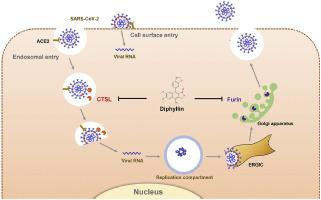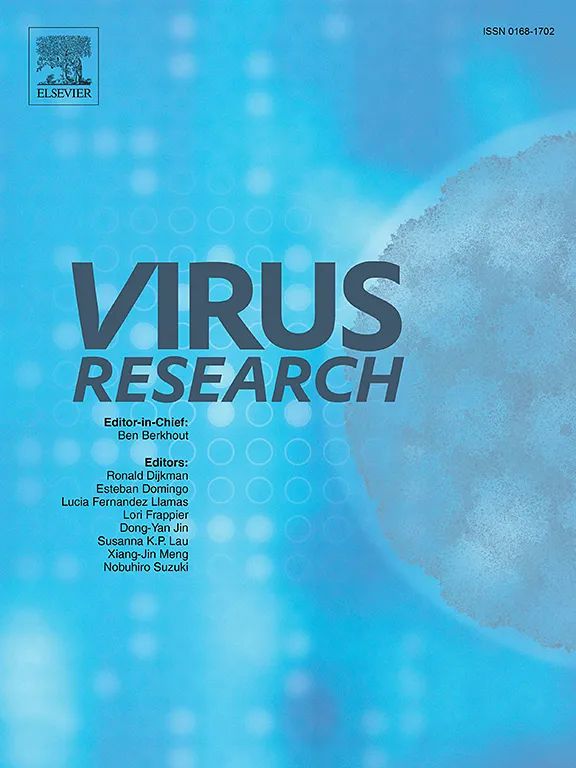二氢霉素通过抑制螯合蛋白酶 L 和呋喃蛋白酶,对 SARS-CoV-2 的进入起到双管齐下的作用。
IF 2.7
4区 医学
Q3 VIROLOGY
引用次数: 0
摘要
严重急性呼吸系统综合征冠状病毒 2(SARS-CoV-2)引发了冠状病毒病 2019(COVID-19)大流行,对全球健康构成严重威胁。目前,治疗 COVID-19 的有效广谱抗病毒药物尚不充足。在本研究中,我们研究了天然木质素二氢叶黄素(PubChem CID 100492)对不同SARS-CoV-2变体的抗病毒活性,并探索了其潜在的分子机制。我们发现,Diphyllin 能剂量依赖性地抑制 SARS-CoV-2 穗状病毒(S)介导的病毒进入不同类型的细胞。这种强效抑制作用对源自原始 SARS-CoV-2 和相关变体(如 Alpha、Beta、Delta 或 Omicron)的尖峰蛋白非常明显。因此,二氢叶绿素还能显著抑制临床 SARS-CoV-2 病毒分离株的体外感染。从机理上讲,通过中和内质体酸化和降低半胱氨酸蛋白酶 cathepsin L (CTSL) 的活性,diphyllin 同时抑制了 SARS-CoV-2 的内质体进入,并通过损害呋喃蛋白酶的活性抑制了 S 介导的细胞表面进入。总之,我们的研究结果表明,diphyllin 是一种新型的 CTSL 和 furin 蛋白酶抑制剂,能双管齐下地阻止 SARS-CoV-2 沿内体和细胞表面途径进入细胞。因此,Diphyllin 有可能作为一种抑制 SARS-CoV-2 进入的药物而得到推广。本文章由计算机程序翻译,如有差异,请以英文原文为准。

Diphyllin elicits a doubled-pronged attack on the entry of SARS-CoV-2 by inhibiting cathepsin L and furin
The severe acute respiratory syndrome coronavirus 2 (SARS-CoV-2) caused the coronavirus disease 2019 (COVID-19) pandemic, posing serious threats to global health. Effective broad-spectrum antiviral drugs for the treatment of COVID-19 are not sufficiently available. In the present study, we investigated the antiviral activity of the natural lignan diphyllin (PubChem CID 100492) against different SARS-CoV-2 variants and explored the underlying molecular mechanisms. We found that diphyllin dose-dependently inhibits the SARS-CoV-2 spike (S)-mediated entry into different types of cells. The potent inhibition was evident against spike proteins derived from the original SARS-CoV-2 and from variants of concern such as Alpha, Beta, Delta or Omicron. Accordingly, diphyllin also significantly inhibited the in vitro infection of a clinical SARS-CoV-2 virus isolate. Mechanistically, diphyllin simultaneously inhibited the endosomal entry of SARS-CoV-2 by neutralizing the endosomal acidification and reducing the activity of the cysteine protease cathepsin L (CTSL) as well as S-meditated cell surface entry by impairing furin activity. Collectively, our findings establish diphyllin as novel inhibitor of CTSL and furin proteases, resulting in a double-pronged attack on SARS-CoV-2 entry along endosomal as well as cell surface routes. Therefore, diphyllin has the potential to be advanced as an inhibitor of SARS-CoV-2 entry.
求助全文
通过发布文献求助,成功后即可免费获取论文全文。
去求助
来源期刊

Virus research
医学-病毒学
CiteScore
9.50
自引率
2.00%
发文量
239
审稿时长
43 days
期刊介绍:
Virus Research provides a means of fast publication for original papers on fundamental research in virology. Contributions on new developments concerning virus structure, replication, pathogenesis and evolution are encouraged. These include reports describing virus morphology, the function and antigenic analysis of virus structural components, virus genome structure and expression, analysis on virus replication processes, virus evolution in connection with antiviral interventions, effects of viruses on their host cells, particularly on the immune system, and the pathogenesis of virus infections, including oncogene activation and transduction.
 求助内容:
求助内容: 应助结果提醒方式:
应助结果提醒方式:


